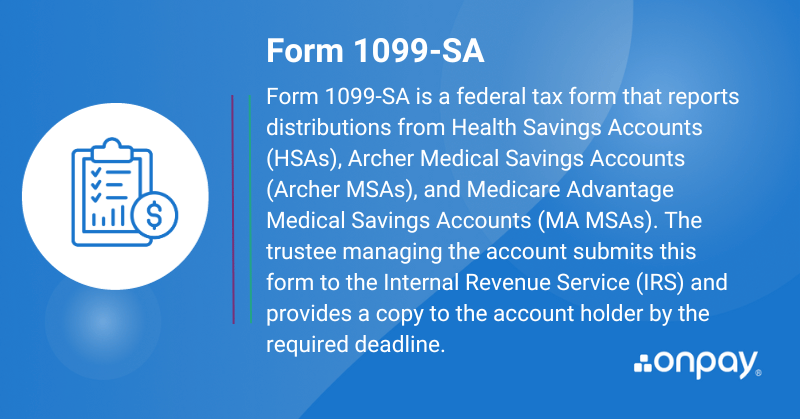Updated: November 9, 2024
Form 1099-SA definition and meaning
Form 1099-SA is a federal tax form that reports distributions from Health Savings Accounts (HSAs), Archer Medical Savings Accounts (Archer MSAs), and Medicare Advantage Medical Savings Accounts (MA MSAs). The trustee managing the account submits this form to the Internal Revenue Service (IRS) and provides a copy to the account holder by the required deadline.
More about what a Form 1099-SA is and its purpose
Distributions (or withdrawals) from an HSA, Archer MSA, or MA MSA must be reported to the IRS using Form 1099-SA. This is in contrast to Form 5498-SA, which is designated for reporting HSA, Archer MSA, or MA MSA contributions.
Similar to Form 5498-SA, the trustee is responsible for completing and submitting Form 1099-SA. The trustee, which could be a bank, insurance company, or an individual approved by the IRS, is the legal entity that establishes, holds, and administers the HSA or MSA.

The basics of HSAs and MSAs
HSAs and MSAs allow participants to save money tax-free to cover eligible medical expenses not included in their health insurance plans. This means that participants won’t pay taxes on the funds deposited into these accounts, provided they don’t surpass the legal limits. Similarly, they aren’t taxed on distributions used for qualified medical expenses.
Employees are more commonly associated with HSAs than MSAs. This is because Archer MSAs are available only to the self-employed and businesses with 50 or fewer employees. Conversely, employers of any size can offer HSAs. Moreover, employers generally can’t provide MA MSAs, as these are specifically for individuals eligible for Medicare.
Now, let’s get back to the topic of Form 1099-SA.
What HSA and MSA participants need to know about Form 1099-SA
- Distributions can be taken tax-free, as long as the funds are used for qualified medical expenses for you, your spouse, or your dependents.
- For the tax year, the trustee will send you a Form 1099-SA detailing your total HSA or MSA distributions. Just like other 1099 forms, the trustee must send Form 1099-SA to the account holder by January 31. They’ll file Copy A with the IRS, provide you with Copy B, and retain Copy C for their records.
- For HSA distributions, you’ll need to complete and attach Form 8889 when filing your tax return. This form should list all contributions and distributions made on your account for the tax year. If you spent any of your HSA distribution on unqualified medical expenses, it becomes taxable. Along with reporting it on Form 8889, you’ll be liable for an additional tax of 20% on that amount.
- For MSAs with unqualified medical expenses, the tax implications are similar. However, instead of Form 8889, you’d use Form 8853 when filing your return.
- Though you don’t need to attach Form 1099-SA to your tax return, consider keeping it for your records.
Form 1099-SA boxes
The legal entity/trustee managing the HSA or MSA is responsible for filling out the form.
- Box 1: Displays the total gross distribution. This could have been paid directly to the account holder or a medical service provider.
- Box 2: Shows any earnings from excess HSA or Archer MSA contributions. This sum is also included in Box 1.
- Box 3: Contains the IRS distribution code indicating the type of distribution. For more information on this, refer to the reverse side of Form 1099-SA.
- Box 4: Reflects the Fair Market Value of the account as of the date the account holder died.
- Box 5: Features a checkbox to specify the account type — whether it’s an HSA, Archer MSA, or MA MSA.
For further details, review the IRS’ Instructions for Forms 1099-SA and 5498-SA.
A note for employers
While trustees bear the responsibility of reporting HSA and MSA distributions via Form 1099-SA, employers have specific obligations regarding contributions. This includes documenting all employee and employer contributions to the HSA or Archer MSA in Box 12 of Form W-2, using the appropriate code.
Using Form 1099-SA in a sentence
“I appreciate that my trustee sends me a Form 1099-SA annually. It shows all of my HSA distributions, including any funds spent on unqualified medical expenses. The form serves as a reminder of the 20% tax I’ll incur for any unqualified medical expenses.”
Terms related to: Form 1099-SA
Articles and resources related to: Form 1099-SA

